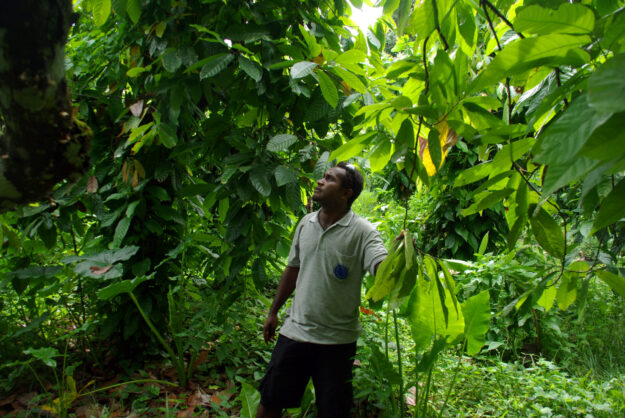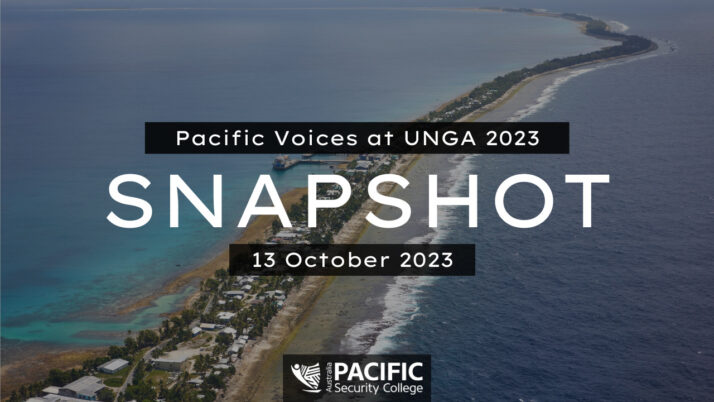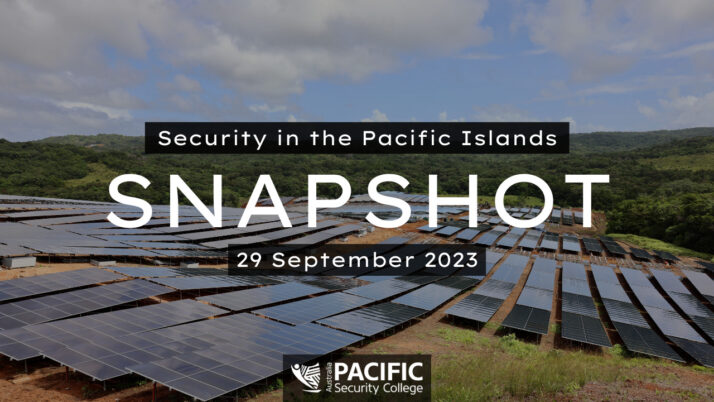It’s time to move beyond a Western understanding of development

Photo by Irene Scott
Measurements of the UN’s Sustainable Development Goals in the Pacific have for too long failed to recognise the importance of traditional systems of knowledge and authority, Danielle Watson and Julie Berg write.
In 2015, Pacific Island nation signatories to the United Nations (UN) committed to addressing sustainable development challenges as outlined in the UN General Assembly 2030 agenda. The agenda included 17 goals identified as necessary to transform the world and achieve a better and more sustainable future for all. Each of these sustainable development goals (SDGs) was premised on the identification of a specific global challenge.
Though more than five years have passed since countries have committed to actioning these goals, reports coming out of the Pacific on achieving SDG 16 – promoting peaceful and inclusive societies, access to justice and strong institutions – remain few and far apart.
This is not to say that there is not work being done across the region that speaks directly to meeting the 2030 Agenda. This work, however, often goes unrecognised as they do not align with the UN’s frequently western-centric understandings of development.
This dichotomy, between contextually specific development and the ‘one-size-fits-all’ approach, is well reflected in two recent country-specific reports on SDG 16 efforts in the Pacific: the 2019 Solomon Islands Access to Justice Study and the 2019 report on Justice Needs and Satisfaction in Fiji.
The first reflects a greater sense of local context, local stakeholders, locally relevant variables and an underlying understanding of place, space, cultural context, and local actors. This is imbued in its approach, use of reporting language and focal areas.
The second, conversely, does not appear to paint an accurate picture of ethnic compilation, local or traditional justice mechanisms, or context. Perhaps the biggest fault in this approach is that it underemphasises local or non-state justice frameworks and how these impact on legal and societal outcomes.
This emphasises that, despite the significant attention given to access to justice by international bodies, there continue to be deficiencies in how ‘access to justice’ is understood in non-Western contexts. Such definitions remain largely limited in their understanding of Indigenous forms of justice and the interface between state and non-state systems.
Unfortunately, where countries lack clear guidelines to inform interpretations of access to justice, it becomes more difficult to determine appropriate measures for what systems and which individuals should be included or excluded.
For example, despite the existence of legislation that acknowledges local justice frameworks such as the 1997 Falekaupule Act in Tuvalu and the 1990 Village Fono Act in Samoa, descriptions of access to justice found within government documents still focus on Western-orientated state-centric models. This lack of formalised recognition of local justice mechanisms further contributes to their invisibility in non-contextualised assessments.
As new and complex issues such as climate change come to the fore, we need to move towards whole-of-society solutions, which recognise the contextual realities of the Pacific Islands and the strength of non-state systems of authority.
Models for assessing the actioning of SDG 16 in Pacific Island contexts should therefore be developed locally or at least in consultation with local stakeholders. This would allow an understanding of development that is situated within local cultures and consciousness that is more truly representative of the challenges and opportunities in the region. The language of assessment used to measure success should also be representative and reflect contextual accuracy.
The way forward necessitates we acknowledge the criticality of rethinking conceptualisations of access to justice. To do this, we must better recognise and understand indigenous forms of justice, as well as the nature of non-state power structures and how they interface with state regimes. If we cannot do this in the face of recurrent regional crises, we risk not only missing the forest, but the trees as well.
Danielle Watson and Julie Berg
This piece was originally published on Policy Forum.
More Stories

Security Snapshot - 13 Oct 2023
Pacific Security Snapshot: Pacific voices at the United Nations
In this special edition of the Pacific Security Snapshot, we look at the key issues raised by Pacific leaders at the recent United Nations General Assembly, including climate change, reform to multilateral institutions and ocean health. “These challenges might be inconvenient for large economies – but I can assure the climate impacts already at our…

Security Snapshot - 29 Sep 2023
Pacific Security Snapshot | 29 September 2023
The security stories shaping the region ➣ 2nd United States-Pacific Islands Forum Summit ➣ Niue and Cook Islands forge diplomatic ties with United States ➣ Chinese navy vessel arrives in Papua New Guinea ➣ Pacific climate change advocacy at the United Nations ➣ El Niño is officially declared ➣ Fifteenth Pacific Health Ministers Meeting in…






